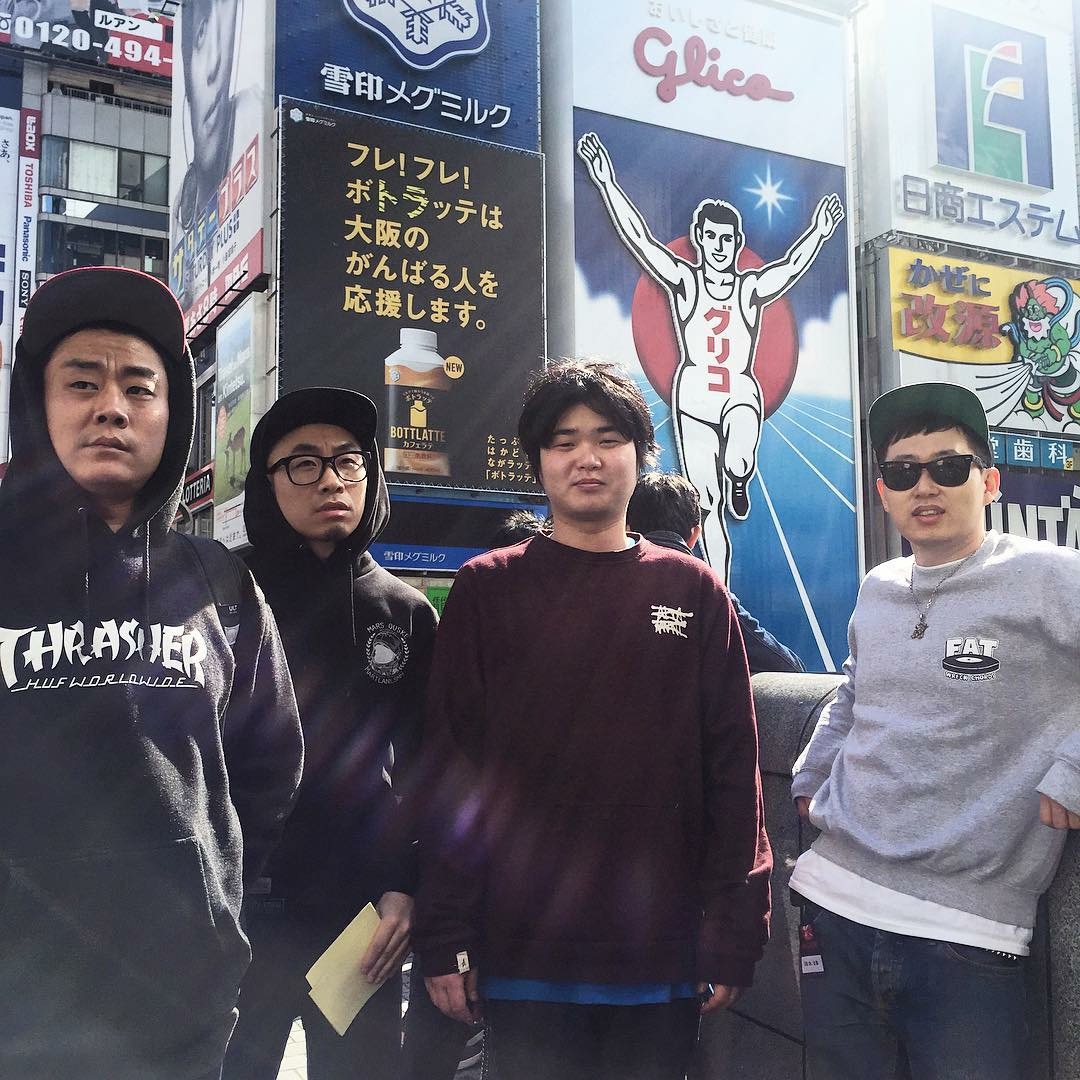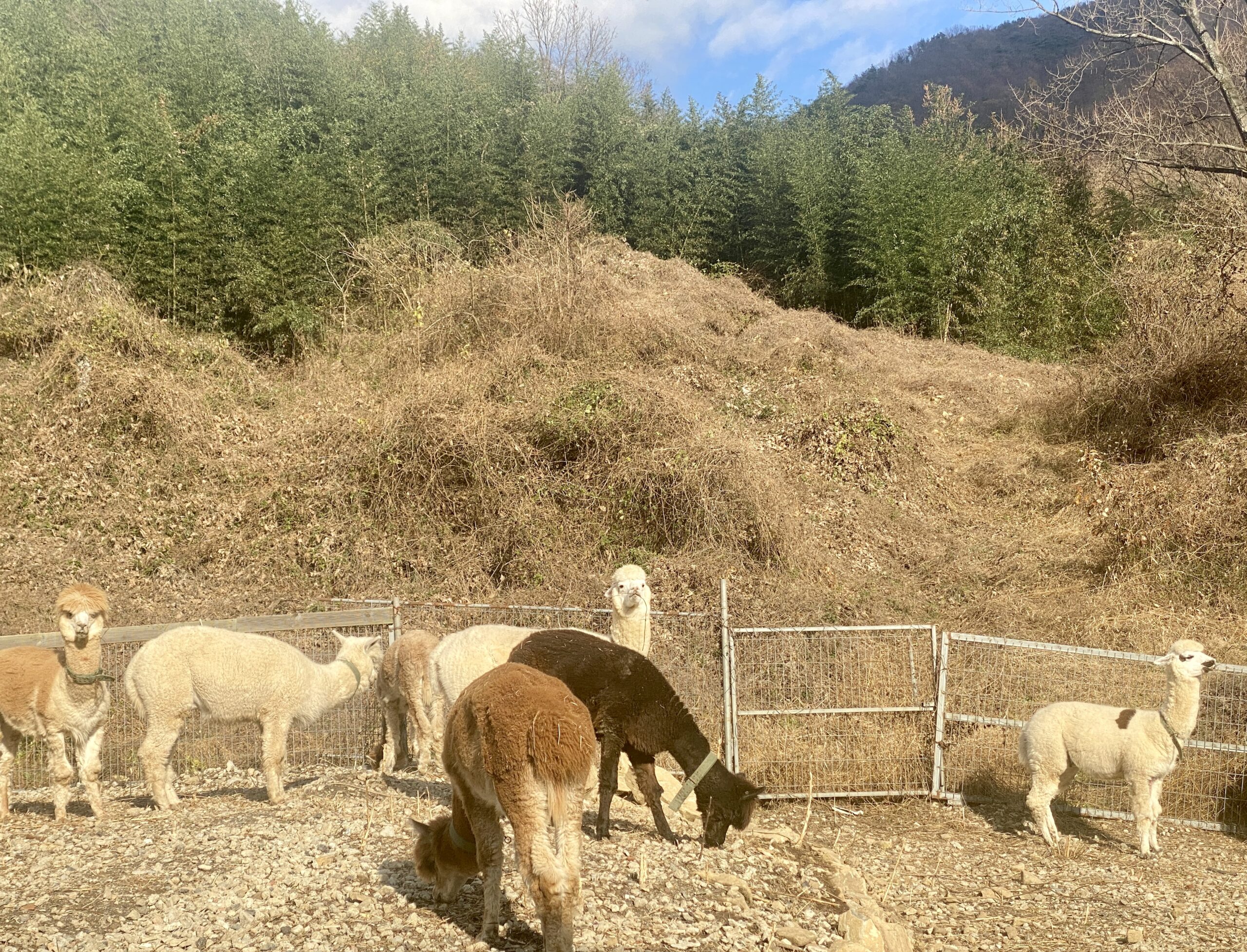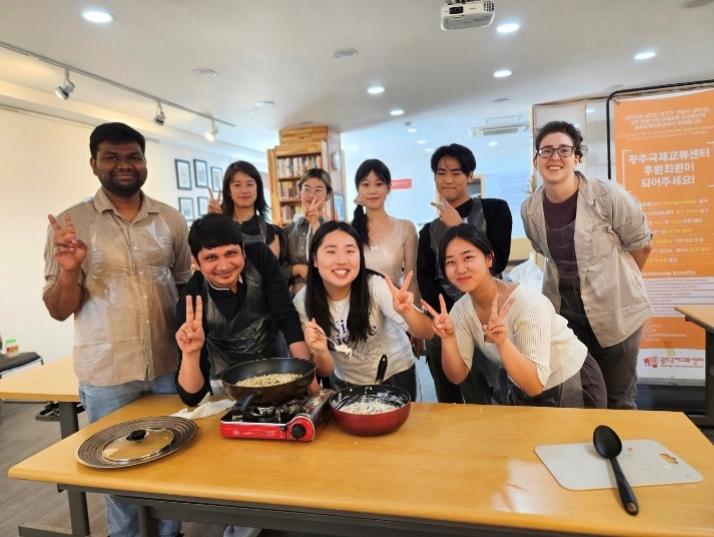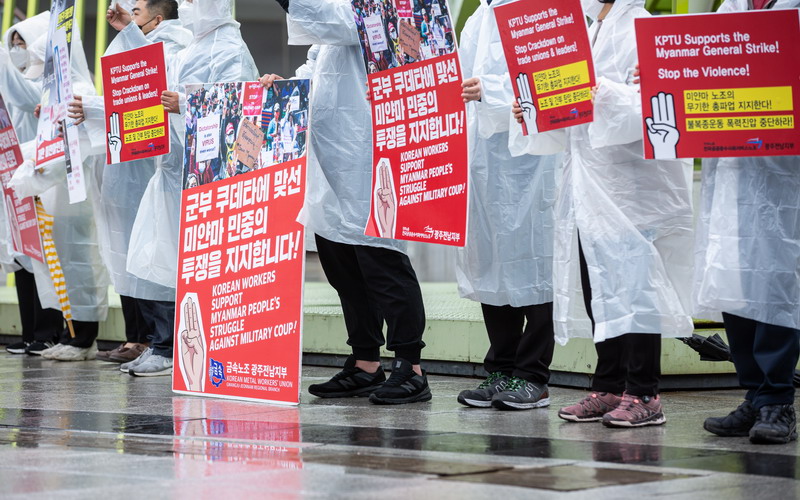Crisis in Myanmar
Interview by Melline Galani.
For months now, many have witnessed the cruelty and abuses made by Myanmar’s military against its own civilians. Demonstrations and a deadly crackdown have embroiled the nation since February. A single coup brought back full military rule following years of quasi-democracy. Week after week, the armed forces have escalated their attacks on the demonstrators. At the time of this interview, the military had already killed hundreds of people – while having assaulted, detained, and/or tortured thousands of others. Gwangju, as a city of human rights, peace, and democracy, cannot remain silent about this situation. Thus, the Gwangju News conducted an interview with Thinzar Aung, a citizen from Myanmar currently residing in Gwangju. Her opinions are shared in this interview. — Melline Galani
Gwangju News (GN): For our readers, would you first tell us a little about yourself and what brought you from Myanmar to Korea?
Thinzar Aung: Yes, of course. I am studying for a PhD in integrative food, bioscience, and biotechnology at Chonnam National University. I am a food inspector for the Food and Drug Administration (FDA) in Myanmar. I came here to study and learn food science and technology. I hope this education will help to improve my potential to serve my country.
GN: What political changes has Myanmar gone through in the past 50 years or so?
Thinzar Aung: There are many political changes that Myanmar has gone through during the past fifty years. But the most dramatic of these can be classified under the names of the generals who held military power in their respective times. In the 1962–1988 period, it was General Ne Win. In 1988–2010, it was General Than Shwe. In 2010–2015, there was General Thein Sein. Most of Myanmar’s past has been under one military regime or another. Even during the last few years, although it was said to be a “democratic” government, it was a fake democracy. From 2010 to 2015, it was mainly a military-backed party, the USDP [Union Solidarity and Development Party], plus the military in power. From 2015 to 2020, the party called the National League for Democracy, or NLD, which was led by Daw Aung San Suu Kyi, won the election. Regardless of this, a quarter of the seats in the parliament are reserved for military officers, even though they were not elected, and all the national security forces are directly under the command of General Min Aung Hlaing. So, one can see that it has not been a true democracy.
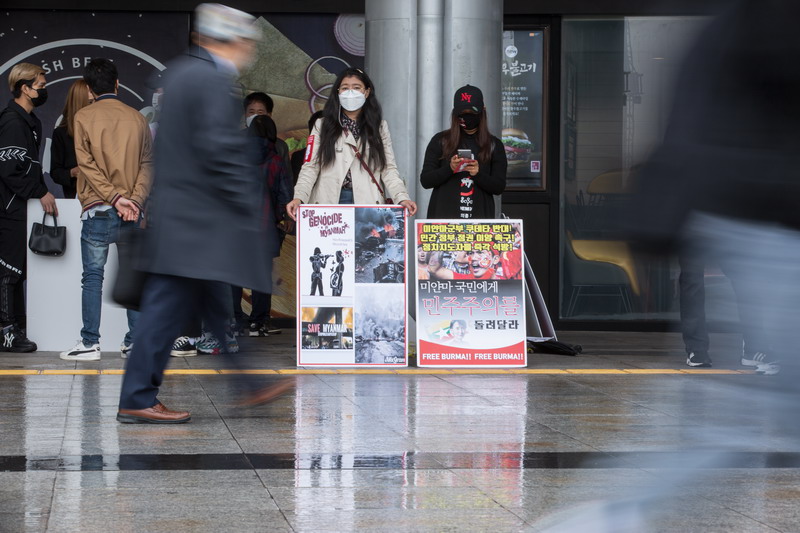
GN: What have been some of the most significant economic and cultural incidents during this time?
Thinzar Aung: As I said, there have been many significant economic and cultural incidents that have taken place during the past 50 years. It is really a long period of history. But if I have to pick the most significant ones nearest to my heart, it would be the 8888 Uprising, and the Saffron Revolution. In the 8888 Uprising, a lot of people died fighting for democracy. You can picture it as being much like the 5.18 Democratic Uprising that happened here in Gwangju; it was similar in many ways. And the 2007 Saffron Revolution is significant in that it was not led by normal civilians but mainly by Buddhist monks. The peaceful Buddhist monks had to go on strike for a revolution because our people were really deep in crises – poor people especially suffered a lot as the prices for fuel and other goods rose about ten-fold. Resultantly, the Buddhist monks who could not stand by and watch such suffering led the revolution and went on strike against the government.
GN: What do you believe has led to the current situation in Myanmar?
Thinzar Aung: What has led to the current situation in Myanmar? The answer is simple: “Greed.” It is greed and a hunger for power on the part of Myanmar’s military generals that know no bounds. The military generals have enough wealth and money to last them many lifetimes. So, you may want to ask why they engaged in a coup at all under such favorable conditions. Well, the catalyst that caused such unrest rests upon the fact that the NLD party wanted to change to a true democracy, so the NLD welcomed ethnic minority groups openly in an effort to attain federal unionization. However, the military did not want to give equality to these minority groups, and instead, they wanted to keep their power. They cannot stand the notion of losing any of their power, specifically the 25 percent of the seats in parliament obtained without votes, as I mentioned before. As you may know, they even have huge business networks across all sectors in Myanmar. Nobody can deny that the profits of these businesses are directly related to their unfairly obtained power and influence. So, to continue with the story of how Myanmar became embroiled in its current crisis, the NLD was to be registered as the new government on February 1. But on that day, early in the morning, the military seized power in the country by announcing a state of emergency. You can get the picture. The military-backed party even accused the legitimately elected party of voting fraud because the military-backed party did not win the elections in the towns, cities, and regions where they thought they had indomitable influence. In reality, the military-backed party itself tried every dirty and cheap trick to win the election, but they could not. So, they arrested the legitimately elected members and staged a coup. This is a fact.
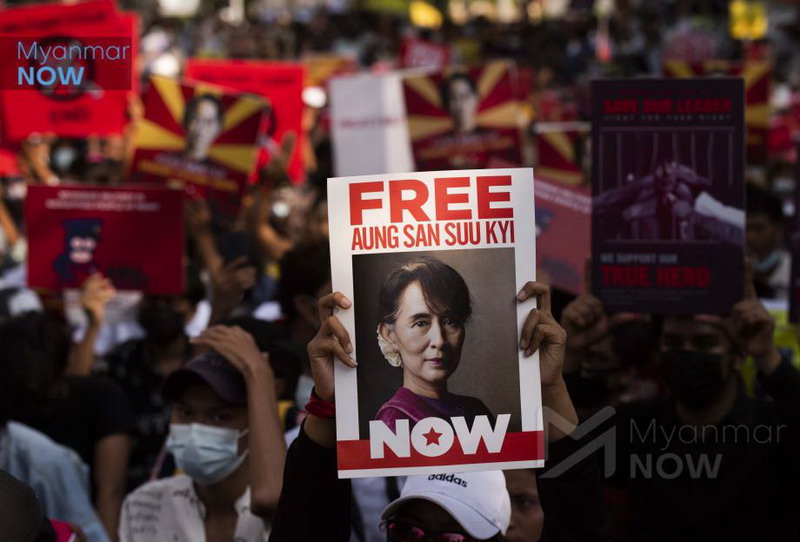
GN: Could you shed some light on how the present protests compare with the 1988 protests?
Thinzar Aung: Simple. Mobile phones. In the modern IT age, many people have connections to the world through the internet and social media. But in 1988, the 8888 Uprising did not have such avenues of communication. It was called the 8888 Uprising because it occurred on the eighth of August, 1988, which is shortened to 8/8/88. A lot of people died while they were protecting the Nobel laureate Daw Aung San Suu Kyi from a military-orchestrated incident that amounted to an attempted assassination of her. Even though many people died in that incident, there were not a lot of documents and photos. The newspaper, the predominant form of media at the time, was under the control of the military. People were kept in the dark about what was happening across the country. Now in the present day, many people are acting as citizen journalists in the present protests in spite of the military trying to cut off the internet and ban social media. On the first day of the coup this year, the military cut off all the mobile phones and telecommunications – both landlines and mobiles. The internet was also taken offline and a total information blackout occurred. People could not call one another. It was like going back to the Stone Age. And then, there was a ban on social media, such as Facebook and Twitter, instituted. Even Wikipedia was banned in Myanmar. Even still, mobile communications are unstable and unreliable. The military has forced the telecom service providers to turn off and on the internet like light switches to disrupt any efforts by the citizens of Myanmar to keep organized amidst the chaos. Then, they do whatever they feel like – without repercussion – to keep people in the dark and cut off from the world. The atrocities they have committed and continue to commit while cutting off the electricity and internet access are unimaginable. We can only pray for the people of Myanmar from far off in these difficult times.
GN: What is the role of the Tatmadaw in Myanmar? How is it that the military has traditionally been so politically powerful?
Thinzar Aung: By definition, the role of the Tatmadaw is to defend the people from threats from outside and inside the country. The military has traditionally been very politically powerful since Myanmar’s initial independence movement and has since become more powerful from 1962 when General Ne Win launched the first coup against U Nu’s government.
GN: What is the present situation with Aung San Suu Kyi, and how much influence is she presently able to exert?
Thinzar Aung: Daw Aung San Suu Kyi has been arrested again on fabricated charges. She sacrificed her life for the sake of our country, but she never once has mentioned that word “sacrifice.” She always says she just chose the path to democracy. She spent more than 15 years of her life under house arrest. I hope she is well and in good health. We have not heard from her since February 1 when the coup occurred. Even though she is charged with so-called “crimes,” she has not even been allowed to meet with her lawyer. In fact, the court session was done only via an online video call, and her second court hearing this month was canceled due to an internet blackout maliciously caused by the military. Can you believe that they cut off the internet and then said the court session could not take place due to that? About her influence though, I would say it is almost nationwide. Almost everyone loves her. Those who do not have been brainwashed by the military. She has only the love, respect, and trust of the people – not any physical power or force over them. Only the military has the weapons, power, and control under the guise of “national security.”
GN: Do you think the present military takeover will be long-lasting?
Thinzar Aung: The present military takeover was absolutely uncalled for. It is illegal and illegitimate. We, the people, voted for the NLD and thought our elected leaders would be in parliament seats and form the government on February 1, as is normal. We thought they would not dare to carry out such a brazen act against democracy itself, because the military’s Senior General MAL said that he would “accept any decisions made by the people of Myanmar.” Now we know his words are not worth a single penny. I do not think this military government will last a long time – at least, not long like the previous one. Yes, the previous coup occurred about sixty years ago, and it lasted about half a decade before returning to a pseudo-democracy. And to think, they even took that cheap imitation of democracy away from us. Now the people, especially the younger people, will not accept military takeover again. They had a small taste of democracy for about five years while the NLD held the majority of seats in the parliament. Despite the fact that a quarter of the seats are reserved for the military, the country truly made considerable progress in the few years that the NLD government held influence.
GN: What has the reaction of the majority of the common people in Myanmar been to the military takeover?
Thinzar Aung: At first, a majority of the common people were shocked and very surprised. They could not believe the situation. And then they became enraged because they could not accept the military takeover regardless of the trumped up reasons the military party gave. Their true, insidious cause was obvious. So, you can see huge crowds protesting in the streets almost everywhere in Myanmar now, despite the overt threat to their lives for doing so. Many good people have died, many good people, like you and me, are still dying – it has even been recorded on video. Some relatives of those in the military, in a flagrant display of their lack of humanity, have given “Haha” reactions to videos of protestors being killed and dying. Can you imagine? You and I, like any other normal human beings, would give our sincere condolences to the fallen angels who have gone back to heaven. Such wanton and reckless taking of human life is never something to laugh at. May their souls rest in peace. It is truly unbelievable that there are people who are more akin to demons and pawns of the devils in this world walking, talking, and using social media as if they were common people.
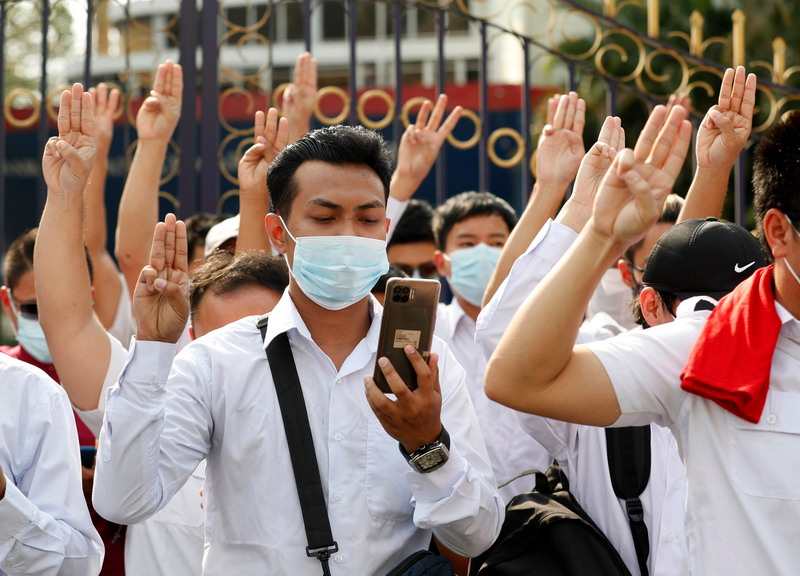
GN: Has the present military takeover had particular consequences for the already highly mistreated Rohingya people?
Thinzar Aung: I have a lot of compassion not only for the Rohingya people but also for the other ethnic groups in Myanmar. We have a lot of ethnic groups who are still fighting for their rights, such as the Kachin, Kaya, Karen, Chin, Mon, Burma, Rakhin, and the Shan. Armed conflicts are not actually that rare in Myanmar. Only in major cities like Yangon and Mandalay can people of all ethnic groups live peacefully and equally. In the border regions of Myanmar, there is no guarantee for the safety of any human being, regardless of their ethnic origin or race. While the ongoing military takeover is in progress, there will be no law and order. When even the state counselor and president of a country have been arrested on fabricated charges, do you think there is still hope for common people like us? Basic human rights like freedom of speech are not allowed in the country. If you protest or just speak out, and the military does not like what you say, the punishment is the death penalty, carried out by a bullet to the head. The lives of all peoples in Myanmar are threatened. No one is safe.
GN: China has considerable influence in Myanmar. In what way do you think China may exert its influence in the current situation in Myanmar?
Thinzar Aung: China has always said, and continues to say, that it will follow a “no-influence policy” in Myanmar politics – but in reality, it already has a lot of influence in Myanmar, both political and economic. I do not know in what way China will exert its influence in my country as a result of the current conflagration, but it will verbally tell you “no influence.” China sells guns and weapons not only to the military but also indiscriminately to ethnic groups as well. So, what the Chinese leaders say with their mouths is not the same as their actions. Most of Myanmar’s projects producing natural resources, such as timber, oil, gas, jade, rubies, rare-earth elements, and the like, are contracted for many years with China-based companies, but we the people did not get a clear version of the contracts involved with this. The local people did not even get any profit from these projects, probably the military and former higher-level government officials benefitted. You can see thousands of military-based businesses spanning all sectors in Myanmar as a result of this inequity, and those military families are incredibly rich.
GN: News reports tell us that many unarmed protesters have been shot and killed by the military. In your opinion, how should the world react to this brutal violation of human rights?
Thinzar Aung: Tragically, the updated death toll is over 738 as of April 21. At the time of this interview, 2,559 citizens of Myanmar are currently being held in detention, and 459 deaths have officially been documented. This is not accounting for all of the missing bodies that have been hidden away or totally destroyed by the military in an effort to cover up its atrocities. You can only imagine what the true state of Myanmar is – the official numbers are not representative of the monstrous acts occurring. It is really a war between unarmed civilians and fully armed soldiers – the inequality is enormous, the cruelty utterly boundless. They not only kill protesters, but they also break into houses and kill people who are residing peacefully. The wickedness is appalling. I saw on the news that even in my hometown of Mandalay, soldiers broke into a house and shot a seven-year-old girl in the back as she cowered from them, clinging to her father for security he could not provide. That blameless little girl died in her father’s arms. The military’s actions are truly ineffable. The military has done and continues to do more heinous things than you could ever imagine, like desecrating and defiling Mya Kyal Sin’s grave. Not even the dead can rest in peace under this barbaric regime. A sad truth is that some people do not even get to be buried because their bodies are not returned to the families. Now, with the help of civilian journalists and professional journalists, the atrocities carried out by the military, like the raiding of people’s homes or dehumanizing acts like forcing people to walk on all fours like a dog, are being documented, photographed, and recorded.
These noble efforts, though, are just the tip of the iceberg of all the atrocities being committed by the military that continue to go undocumented. There are many more acts of savagery that have not been brought to light as evidence and have failed to reach the international media because of the military’s forced blackout. The social media ban is still in effect at the time of this interview, and the internet blackout is being used by the military as they see fit to prevent the people of Myanmar from contacting the outside world. So, in my opinion, the world should hear the voices of the Myanmar people asking for help and should really help them, as they are in need. Innocent people’s lives are being taken in the foulest ways with reckless abandon. The only voices and words that are able to reach the outside world are just a fraction of those of people who are really in need; only a part of the living nightmare that Myanmar has become is being elucidated. Only those who are well educated in English have fiber-internet in their homes and electricity-powered personal generators – that is, only those who are rich enough to afford all these things and have not been corrupted by the military are able to talk about what is happening. So, I ask you again not to be annoyed by the cries for help, and I implore you to hear their voices. What they are doing is not only for themselves but also for all the many others without voices.
GN: We are deeply thankful to you for having the courage to speak with us. What we have heard is horrible and, as part of the Gwangju community, we will do our best to raise awareness and find ways to help the Myanmar people. Gwangju will always be with the people of Myanmar.
The Interviewee
Thinzar Aung is a Burmese student who is currently earning a PhD at Chonnam National University. She is from Mandalay, Myanmar, where she worked as a food inspector for the Food and Drug Administration (FDA) there. Although her job and potentially her life might be in jeopardy as a result of giving this interview, she is willing to speak out against the military coup and asks for international help for her people. Instagram: @junothinzar Thinzar
Photographs by Kim Hillel Yunkyoung and courtesy of Myanmar Now.

